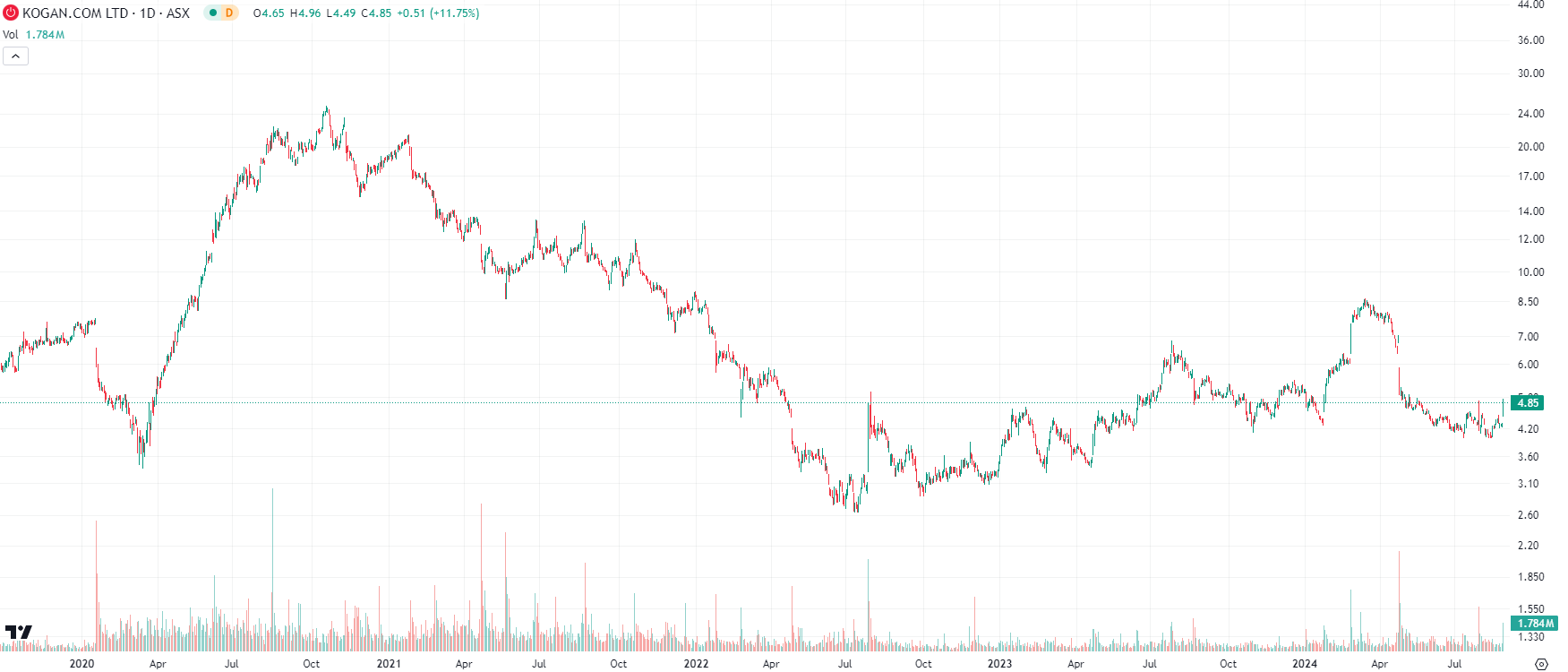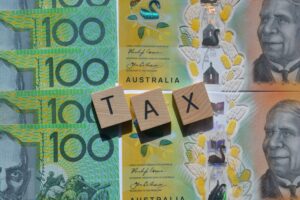Here’s why Kogan (ASX:KGN) should be on your watchlist for FY25
![]() Nick Sundich, August 29, 2024
Nick Sundich, August 29, 2024
Kogan shares (ASX:KGN) have been volatile in the past couple of years, but is a better future ahead of it? At first glance, it may not appear a good pick given softening consumer demand, intense competition and negative earnings right now. But the company appears in better shape when you take a deeper dive – arguably even better than it was during the pandemic.
Who is Kogan?
Kogan is an eCommerce retailer, founded in 2006 by Ruslan Kogan. You would likely know Kogan because of its online store. This is indeed the business’ flagship division, but it is more than that. It offers mobile phone plans, insurance, internet and financial services.
Even amidst its eCommerce store it sells its own products and exclusive Brands in addition to products made by third-party companies. Exclusive Brands now account for more than half of Kogan’s gross profit. The company also owns Mighty Ape, an ecommerce retailer in New Zealand, and the eCommerce assets of Dick Smith. And importantly, it has 31 warehouses to meet the demand of its 4.1m active shoppers.
It also has a membership program called Kogan First that is designed to be similar to Amazon Prime. It has more than 400,000 members. Kogan First is the company’s opt-in premium membership service. It is similar to Amazon Prime, offering exclusive deals and perks, such as free shipping and exclusive access to Kogan First Day, one annual day where members get exclusive deals.
Kogan shares dropped back to Square One, but are recovering
After the Corona Crash, KGN shares increased by nearly 500% in just 7 months as Australian consumers swapped brick-and-mortar stores for online retail. But the shares gave up just about all of these gains over the following 2 years as illustrated in the chart.
A significant number of consumers that shifted online moved back to their regular shopping habits once stores re-opened. Kogan was left with a glut of inventory, having built up its inventory in anticipation that the boom would persist in the medium term and wanting to avoid supply chain disruptions.

Kogan (ASX:KGN) share price chart, log scale (Source: TradingView)
Founders selling down and less than optimal results hurt investor confidence
The drying up of dividends and the selling down of shares by the company’s co-founders haven’t helped the cause either. Co-founders Ruslan Kogan and David Shafer owned 69.5% of Kogan shares in 2016, but barely own 19% between them today. In particular, the company’s namesake sold $114m when the share price was over $20. There was a further controversy just a few months ago – in April 2024 – when the co-founders sold options back to the company for the difference between their strike price and a proxy share price that was 50% higher than the strike price. A few weeks later, the company released a trading update that left investors disappointed.
In FY22 (the 12 months to 30 June 2022), the company made a $35m statutory loss, down from a ~$3m profit in FY21. Admittedly, both figures were impacted by one-off items, such as disposals of assets and equity-based compensation expenses. But even the adjusted NPAT didn’t paint a rosy picture, falling from $42.9m in FY21 to a $2.9m loss in FY22. Although Kogan’s revenues were ahead of pre-COVID levels, these fell 8% to $718.5m.
Kogan’s FY23 results did not appear good at first glance. The bottom line (NPAT) was still in negative territory and revenue was down 32% in 12 months. However, there were some positive signs:
- Inventory falling from $159.9m to $68.2m
- Recording $70.9m in operating cash flow
- The net cash balance doubled from $31.2m to $65.4m even with the last Mighty Ape acquisition payment
- Group customers were nearly $3m
- The Loyalty program surpassed 401,000 subscribers and made $26.3m in revenue, a figure up 70% year on year.
Although the pandemic is long behind us, it is easy to forget that Kogan First was growing even before the pandemic at 12% a year. Kogan was consistently outperforming the market with 20% sales growth per year.
Kicking @ss in FY24!
Kogan unveiled its FY24 results earlier this week and investors received these well. Even though gross sales and revenue came in 4.8% and 6.1% behind the year before, at $809m and $459.7m, the company’s gross profit increased 23.3% to $168.4m, representing a gross margin nearly 10 percentage points ahead of the year prior. It boasted surpassing over half a million Kogan First Subscribers.
The company’s profit on a statutory basis was a wafer-thin $0.1m profit, compared to a $25.9m loss in the year prior. Its adjusted profit (excluding forex losses, equity-based compensation and one-off non-recurring items) was $21m which was well ahead of the $4.3m loss in FY23.
You might be wondering how a relatively small, local eCommerce company can compete with global giant Amazon. Well, Kogan is in a different space than Amazon, because they are in different product categories. Amazon tends to sell perishables and low-cost apparel products, while Kogan sells consumer electronics and home furnishings. The company has simplified its supply chain so it obtains the goods straight from the manufacturer.
The next 3 years are looking good
There are 7 analysts covering Kogan and their mean target price of $6.35, up 30% from the current price. For FY25 they expect $497.7m in revenue and $0.22 EPS which would translate to a profit of $22m with ~100m shares on issue. In FY26, $529.9m revenue and a $27m profit. The company is trading at 22.4x P/E for FY25.
Kogan is one for the watchlists
We think investors should take a look at Kogan, but it might be one to hold off buying until just before the 1HY25 numbers come out. We think the company is headed in the right direction, although there is potential for short-term volatility given the surge after its results.
All things considered, we think Kogan is a company investors should watch closely. It has been through a volatile 3 year period, but we think it is set for a more stable future with consistent growth just like that which it endured prior to the pandemic and will be a better business than otherwise would be the case.
What are the Best ASX Stocks to invest in right now?
Check our buy/sell tips
Blog Categories
Get Our Top 5 ASX Stocks for FY25
Recent Posts
The $3m super tax is coming! If you’re invested in equities, here is how it might impact you
It seems during the next 3 years, the $3m super tax will be officially a thing. Itwas blocked by the…
Northern Star Resources (ASX:NST): The $28bn gold miner that stands above them all
Northern Star Resources (ASX:NST) is by far the largest gold company on the ASX, capped at $28bn as of May…
6 ASX stocks you forgot were listed
Here are 6 ASX stocks you forgot were listed Brisbane Broncos (ASX:BBL) No it is not a mistake. This…



